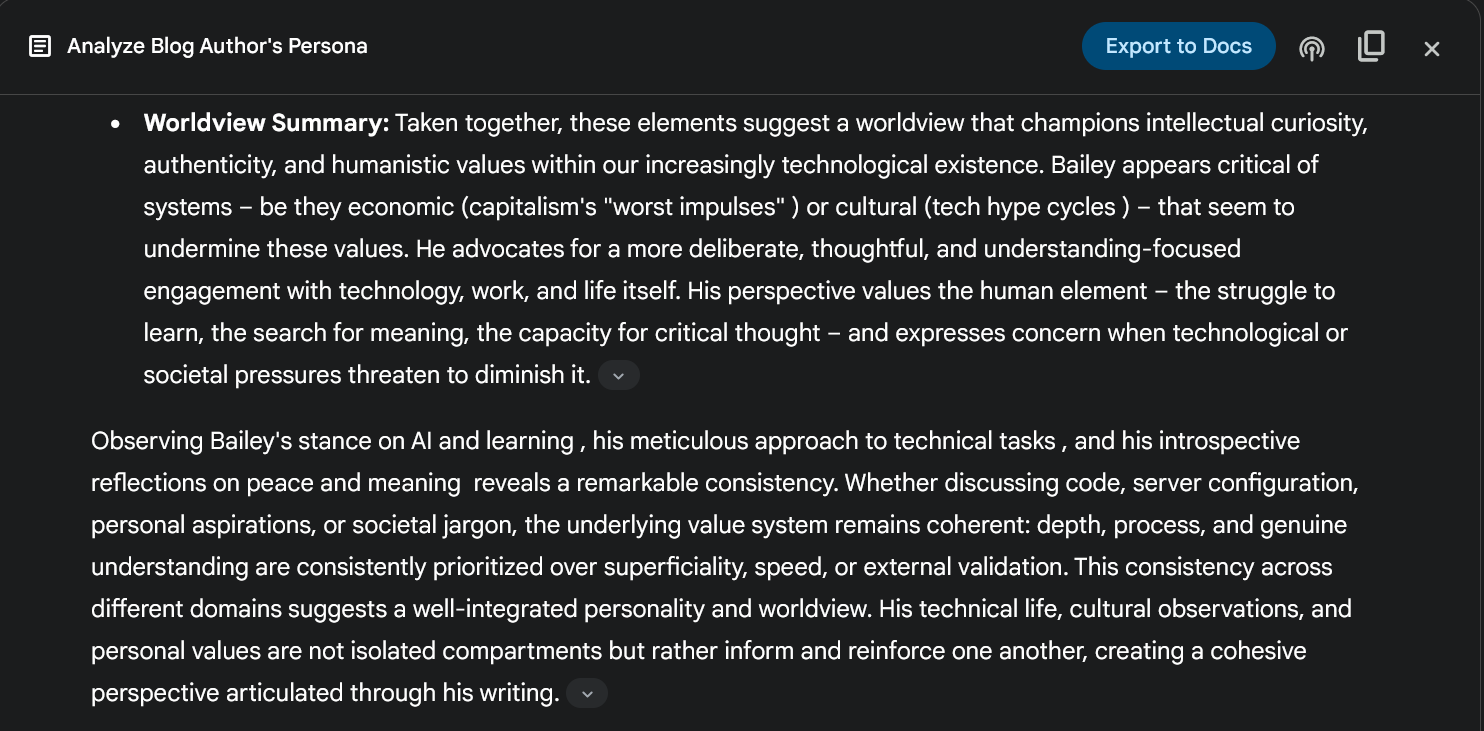Research Models and the Future of Search

In my self-appointed role as moral and practical judge of artificial intelligence and its uses I have rarely come across a product that I didn't end up finding boring or uninteresting after its novelty wore off. Most base or chatbot models are unreliable. Code models can be nice for tabbed autocomplete or boilerplate but I usually don't find them very helpful in the context of the large, complex, and often legacy codebases I work with professionally. I believe people who say they've found ways to make these useful in their workflows, but between the time it takes to establish a good workflow and the attached deskilling cost I don't think the juice is worth the squeeze. So when I read Simon Willison's post about how AI-assisted search actually works now I was skeptical. But I've been giving Gemini Deep Research a whirl and I actually might agree with him.
A whole lot of my day-to-day is spent sifting the wheat from the chaff of search results: picking the right python package, finding the GitHub issue that has a solution to an error message, or digging through poorly-written docs and trying to figure out what something actually does. This is made enormously difficult by the sheer quantity of slop, human and robot-generated alike, that populates any search engine's results today. I am looking for specific solutions to specific problems, but I'm forced to spend hours of my life speed-reading shitty blog posts from click farms with ads that make the website functionally unusable in the hopes that their tutorial might actually contain something I need. I imagine most professional programmers have had similar experiences.
Deep research does a pretty nice job of solving this problem (at least Gemini's version does - I refuse to give OpenAI money and I got Gemini access for free). This is in large part due to advances in LLM output quality in general and a massively-increased 1 million token context window. The biggest killer feature here, of course, is live web browsing - I haven't been able to find a good technical explanation of how deep research actually works, but I'd reckon it's web-scraping that's then fed into a RAG framework. However it's done, it's able to distill a whole lot of search results into a useful, cited summary. I wouldn't trust its outputs implicitly, but it's significantly less prone to hallucination than prior ventures into this territory, and as Willison puts it, it does a nice job of filling the role of a junior researcher (or, I guess in my professional use case, an intern).
(I've written enough about the economic implications of AI replacing junior-level positions so I won't get into it here - suffice it to say I do not think, writ large, this is a good thing. A nuance that often seems to elude people online is that "useful" is not a synonym for "good".)
This is, to my mind, the closest thing to a killer app for LLMs that I've seen: I don't really want one to write my emails or generate art for me, nor would I trust it to do so, but as an engine for scanning and distilling text it does a pretty damn good job, and I don't think that "automating the act of Googling something" is a deskilling risk in the same way as letting it do the actual work for you. The risk of hallucination is there, but again, I'm not sure that that's any worse than reading poorly written, factually incorrect articles by human beings (or having to sift through an article myself until I can be certain it was written by AI).
The irony here is that part of what makes Deep Research so useful is Google's decade-long decline into an enshittified mess. I might not be quite so taken with it if I didn't have to spend so much time wading through SEO bullshit and AI-generated slop. Search has been dying through years through Google's own efforts, and now they may have launched the product that finally kills it for good. This is pretty interesting on its own - it's highly likely that Deep Research will have its own DeepSeek moment at some point in the near future, and it's not clear to me what the business move is for a search firm if search dies and is replaced by a race to the cheapest model. I have trouble seeing the death of Google search as anything but an ultimately good thing, and I'm very curious to see the second and third-order effects if Deep Research-like models start to replace search wholesale. These models couldn't exist without a search index to build on, but the endless ouroboros of generated slop content, combined with a search index that's no longer the primary target of digital publishing, will take us to a weird place. The internet could actually die this time!
To be clear, the irony of "using LLMs to solve a problem created by LLMs" is not lost on me. I'm not sure any of this is good, but I'm also not sure it's worse than what we already have. And once an open-source alternative is made available I'll be happy to rid Google of that much search data and advertising income. I've spoken before about how AI will kill the internet, and this is an interesting new front of that fight that I hadn't considered before. At the very least if Google eats itself maybe that'll make room for something different.